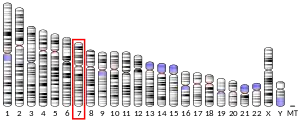STEAP4
STEAP family member 4 is a protein that in humans is encoded by the STEAP4 gene.[5]
Function
The protein encoded by this gene belongs to the STEAP (six transmembrane epithelial antigen of prostate) family, and resides in the golgi apparatus. It functions as a metalloreductase that has the ability to reduce both Fe(3+) to Fe(2+) and Cu(2+) to Cu(1+), using NAD(+) as acceptor. Studies in mice and human suggest that this gene may be involved in adipocyte development and metabolism, and may contribute to the normal biology of the prostate cell, as well as prostate cancer progression. Alternatively spliced transcript variants encoding different isoforms have been found for this gene
References
- GRCh38: Ensembl release 89: ENSG00000127954 - Ensembl, May 2017
- GRCm38: Ensembl release 89: ENSMUSG00000012428 - Ensembl, May 2017
- "Human PubMed Reference:". National Center for Biotechnology Information, U.S. National Library of Medicine.
- "Mouse PubMed Reference:". National Center for Biotechnology Information, U.S. National Library of Medicine.
- "Entrez Gene: STEAP family member 4".
Further reading
- Zhang CM, Chi X, Wang B, Zhang M, Ni YH, Chen RH, Li XN, Guo XR (May 2008). "Downregulation of STEAP4, a highly-expressed TNF-alpha-inducible gene in adipose tissue, is associated with obesity in humans". Acta Pharmacologica Sinica. 29 (5): 587–92. doi:10.1111/j.1745-7254.2008.00793.x. PMID 18430367. S2CID 20248700.
- Bi YW, Wang CM, Yan ZT, Li NF, Guo YY, Wang HM, Yao XG, Liang DP (February 2011). "[Negative association of STAMP2 gene polymorphisms with essential hypertension in Xinjiang Uygur population]". Zhonghua Yi Xue Yi Chuan Xue Za Zhi = Zhonghua Yixue Yichuanxue Zazhi = Chinese Journal of Medical Genetics. 28 (1): 64–8. doi:10.3760/cma.j.issn.1003-9406.2011.01.015. PMID 21287513.
- Kralisch S, Sommer G, Weise S, Lipfert J, Lossner U, Kamprad M, Schröck K, Bluher M, Stumvoll M, Fasshauer M (April 2009). "Interleukin-1beta is a positive regulator of TIARP/STAMP2 gene and protein expression in adipocytes in vitro". FEBS Letters. 583 (7): 1196–200. doi:10.1016/j.febslet.2009.03.015. PMID 19289123. S2CID 31106264.
- Guo YY, Li NF, Wang CM, Yan ZT, Zhang JH, Wang HM, Zhou L, Luo WL (February 2011). "[Genetic variation and association of STEAP4 gene with metabolic syndrome in Chinese Uygur patients]". Zhonghua Yi Xue Yi Chuan Xue Za Zhi = Zhonghua Yixue Yichuanxue Zazhi = Chinese Journal of Medical Genetics. 28 (1): 78–82. doi:10.3760/cma.j.issn.1003-9406.2011.01.018. PMID 21287516.
- Nanfang L, Yanying G, Hongmei W, Zhitao Y, Juhong Z, Ling Z, Wenli L (August 2010). "Variations of six transmembrane epithelial antigen of prostate 4 (STEAP4) gene are associated with metabolic syndrome in a female Uygur general population". Archives of Medical Research. 41 (6): 449–56. doi:10.1016/j.arcmed.2010.08.006. PMID 21044749.
- Tanaka Y, Matsumoto I, Iwanami K, Inoue A, Minami R, Umeda N, Kanamori A, Ochiai N, Miyazawa K, Sugihara M, Hayashi T, Goto D, Ito S, Sumida T (February 2012). "Six-transmembrane epithelial antigen of prostate4 (STEAP4) is a tumor necrosis factor alpha-induced protein that regulates IL-6, IL-8, and cell proliferation in synovium from patients with rheumatoid arthritis". Modern Rheumatology. 22 (1): 128–36. doi:10.1007/s10165-011-0475-y. PMID 21633911. S2CID 21108512.
- Guo YY, Li NF, Zhou L, Yao XG, Wang HM, Zhang JH, Luo WL (July 2011). "A common variation within the STEAP4 gene exons is associated with obesity in Uygur general population". Chinese Medical Journal. 124 (14): 2096–100. PMID 21933608.
- Wangensteen T, Akselsen H, Holmen J, Undlien D, Retterstøl L (March 2011). "A common haplotype in NAPEPLD is associated with severe obesity in a Norwegian population-based cohort (the HUNT study)". Obesity. 19 (3): 612–7. doi:10.1038/oby.2010.219. PMID 20885390. S2CID 205528202.
- Korkmaz CG, Korkmaz KS, Kurys P, Elbi C, Wang L, Klokk TI, Hammarstrom C, Troen G, Svindland A, Hager GL, Saatcioglu F (July 2005). "Molecular cloning and characterization of STAMP2, an androgen-regulated six transmembrane protein that is overexpressed in prostate cancer". Oncogene. 24 (31): 4934–45. doi:10.1038/sj.onc.1208677. PMID 15897894. S2CID 22999842.
This article incorporates text from the United States National Library of Medicine, which is in the public domain.



